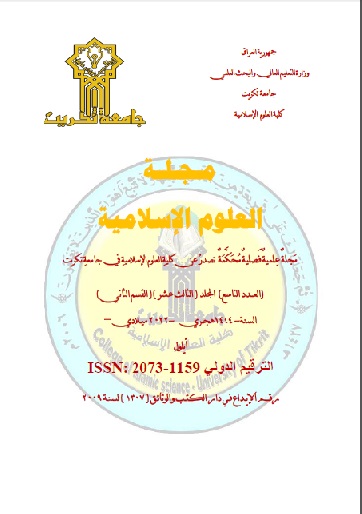Abstract
Scholars were keen to study the noble Prophet’s hadith as it is the second source after the Noble Qur’an, and to distinguish its true from its inaccurate. In the aspect of criticism of hadith and the explanation of its divisions and discussion of it, a group of hadith scholars emerged from among them (Imam Abu Ahmad Ibn Uday al-Jurjani, may Allah have mercy on him). The dilemma and how did Ibn Uday apply this term to a number of hadiths that he mentioned in his complete book on weak men?
So I knew the problem and explained its application to the scholars, and arranged the hadiths in this research according to their receipt in his complete book, and then I extract it briefly in the text except for a need, so I make the extract in the margin, I translated for some of the narrators whom I saw the necessity of translation for them because they relate to the hadith document, and I mention the ruling on the hadith when I see necessity He mentioned it, as the summary of the speech on the hadith and the reason why Ibn Uday described it as incurable, and it was found through the research that Ibn Uday did not use the word “mushal” on the hadith that is easy and weak, but rather on the one that does not force, so we find in the first hadith he used it because of the fall of two narrators, and in the second hadith because of the fall A large number of narrators, and in the third and ninth hadeeth he called it on the subject, and in the fourth, fifth, sixth and tenth on the communicator, but he is very weak, and in the eighth on ignorance and weakness
So I knew the problem and explained its application to the scholars, and arranged the hadiths in this research according to their receipt in his complete book, and then I extract it briefly in the text except for a need, so I make the extract in the margin, I translated for some of the narrators whom I saw the necessity of translation for them because they relate to the hadith document, and I mention the ruling on the hadith when I see necessity He mentioned it, as the summary of the speech on the hadith and the reason why Ibn Uday described it as incurable, and it was found through the research that Ibn Uday did not use the word “mushal” on the hadith that is easy and weak, but rather on the one that does not force, so we find in the first hadith he used it because of the fall of two narrators, and in the second hadith because of the fall A large number of narrators, and in the third and ninth hadeeth he called it on the subject, and in the fourth, fifth, sixth and tenth on the communicator, but he is very weak, and in the eighth on ignorance and weakness
Keywords
Hadith
Problematic
Ibn Uday
Weak men
Grad
Abstract
حرص العلماء على دراسة الحديث النبوي الشريف كونه المصدر الثاني بعد القرآن الكريم وتمييز صحيحه من سقيمه، وجعلوا لكل قسم من أقسام الحديث ما يدل عليه، ومن هذه الأقسام (المعضل)، وقد كتب أهل العلم فيه كثيرا بيانا لمعالمه وكيفية استخدام هذا المصطلح حال التطبيق، وبرز في جانب نقد الحديث وبيان أقسامه والكلام عليه جمع من أهل الحديث منهم (الإمام أبو أحمد ابن عدي الجرجاني رحمه الله)، وقد كتب كتابا في هذا الجانب ذكر فيه الرواة الضعفاء وبعض أحاديثهم التي انتقدت عليهم، وشاركت في دراسة هذا الكتاب وكان الاختيار على الحديث المعضل وكيف طبق ابن عدي هذا اللفظ على جملة من الأحاديث التي أوردها في كتابه الكامل في ضعفاء الرجال , فعرفت بالمعضل وبينت تطبيقه عند العلماء , ورتبت الاحاديث في هذا البحث حسب ورودها في كتابه الكامل ,ثم أقوم بتخريجه مختصرا في المتن إلا لحاجة فأجعل التخريج في الهامش, ترجمت لبعض الرواة الذين رأيت ضرورة الترجمة لهم لتعلقهم بسند الحديث , وأذكر الحكم على الحديث حين أرى ضرورة ذكره , كما بينت خلاصة الكلام على الحديث وسبب وصف ابن عدي له بالإعضال, وتبين من خلال البحث ان ابن عدي لم يطلق لفظ المعضل على الحديث اليسير الضعف , وانما على الذي لاينجبر , فنجد في الحديث الاول اطلقه بسبب سقوط راويين , وفي الحديث الثاني بسبب سقط عدد كبير من الرواة , وفي الحديث الثالث والتاسع اطلقه على الموضوع , وفي الرابع والخامس والسادس والعاشر على المتصل لكنه شديد الضعيف وفي الثامن على الجهالة والضعف .
Keywords
الحديث
المعضل
ابن عدي
ضعفاء الرجال
ا
